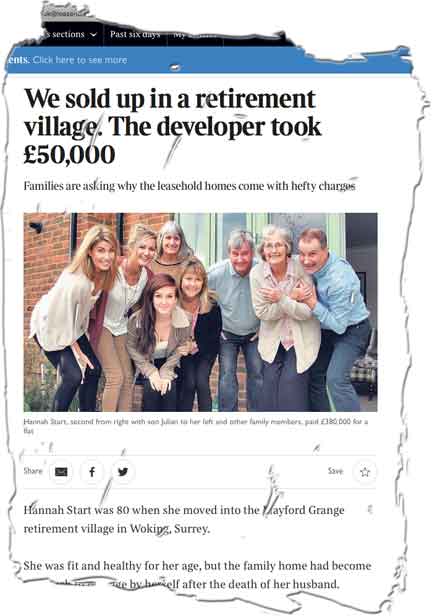But a cash loss from purchase of only £5,000 is not THAT bad, in UK retirement housing …
By Sebastian O’Kelly

Yet again retirement housing is in the news: this time Retirement Villages charging £50,000 in exit fees to a family who sold a two-bedroom flat at Mayford Grange, in Woking in Surrey.
The Sunday Times contacted www.BetterRetirementHousing.com before publication, but we felt there was little that was very scandalous about the charges.
Retirement Villages, which is a member of the Association of Retirement Community Operators, makes its exit fees, which can be as high as 12.5%, very clear on its website.
Nonetheless, the family of Hannah Stuart are indignant. She paid £380,000 for a two-bedroom flat at Mayford Grange in 2010.
We sold up in a retirement village. The developer took £50,000
Hannah Start was 80 when she moved into the Mayford Grange retirement village in Woking, Surrey.She was fit and healthy for her age, but the family home had become too much to manage by herself after the death of her husband.Mayford Grange, which was brand new with an on-site restaurant and commun
Hannah Start was 80 when she moved into the Mayford Grange retirement village in Woking, Surrey. She was fit and healthy for her age, but the family home had become too much to manage by herself after the death of her husband. Mayford Grange, which was brand new with an on-site restaurant and commun
Hannah’s son, Julian, tells The Sunday Times: “They made the fee clear and said it was to maintain the complex, even though there was also an annual service fee of more than £7,000. I didn’t baulk at it because it was where Mum wanted to live.”
When Hannah died in August 2017 and the family sold the flat for £425,000, they received a bill for more than £50,000.
Julian, 62, said: “The fees didn’t come as a surprise but I do think they are unfair and there doesn’t seem to be a logical reason [for them].”

But the reason is clear enough: retirement community operators have considerable facilities and services to maintain and require a sizeable income to maintain them.
These points were made in the article by Retirement Villages CEO Andrew Ovey.
When I attended the ARCO conference last year, I met an ex-banker moving into the retirement housing market.
His interest lay in the posher retirement complexes providing a range of services and facilities.
He wanted to sell his flats at a considerable premium compared with the local property market, add at least 15% profit into the service charges and get a 15% exit fee when the property was sold.
>ARCO conference offers a different vision to retirement housing, but … – Better Retirement Housing
There will be – and there are already – issues with big event fees The conference of the Association Retirement Community Operators in central London last week offered a fascinating alternative vision for the retirement housing sector to the one that we have. The organisation represents providers who build and manage their own sites, as …
There will be – and there are already – issues with big event fees The conference of the Association Retirement Community Operators in central London last week offered a fascinating alternative vision for the retirement housing sector to the one that we have. The organisation represents providers who build and manage their own sites, as …
Other services, such as monopoly estate agency, would also rack up fees, one imagines.
None of these income streams are adequately defined in leases or other contracts for two reasons.
First, the retirement community provider wants as much freedom of action as possible, including reducing services if costs rise. Secondly, the provider may want to make more money from the site.
As no one ever gives up power voluntarily, the retirement community operators are not going to nail down every income stream to a specific service and be entirely accountable unless they are compelled.
In a complicated service sector business like running a retirement community site, this is not entirely unreasonable, to some degree. However, the more the services are defined in the lease, the better: this should be a prime concern of buyers.
These communities, usually set around a communal centre like at old country house, are rather more complicated than just a lease to a flat in a block of apartments.
This means that choosing a retirement community operator is a huge leap of faith for families, usually at a time when they are desperate and an elderly relative needs to be rehoused. Some are good; some are less good; some are appalling.
The worst banditry www.BetterRetirementHousing.com has encountered has been in posher retirement community sites.
There is obviously huge scope for abuses here, and we have always been very wary of exit fees as an acceptable business model in retirement housing.
The obvious reason for this is that a retirement site is more profitable if the exit of its residents is not too long delayed. If all the residents enjoyed happy, extended longevity, the business model would go askew.
So, we are opposed to exit fees that are for undefined services. The Law Commission, unwisely in our view, endorsed them in a report that has not been carried forward by government.
Scandals in Australia surrounding retirement exit fees over the past year appear to vindicate our reservations.
The volume house builder independent living retirement model, of McCarthy and Stone and Churchill, has given rise to a host of issues that have been exhaustively covered on this website.

In these models, there is a minimum of services beyond a resident or (these days) visiting house manager and a communal lounge.
Resale prices for these flats are frequently dismal.
All in all, the Stuart family have not had that bad an experience in retirement housing, from a financial point of view.
They bought their flat for £380,000 at Mayfield Court from Retirement Villages for £380,000 and sold it, we were led to believe back to Retirement Villages itself, for £425,000.
Less £50,000 in exit fees, that means that the family only suffered a £5,000 loss on the purchase price of 2010.
Compared with the catastrophic falls in value of some McCarthy and Stone and Churchill independent living flats, this is not at all bad.
Of course, compared with the local residential property market in affluent Woking, which is prime Surrey commuter land, the capital values are very poor indeed.
But here one has to add a separate point.
Did Hannah Stuart live happily at Mayfield Court and was her time in a Retirement Village complex a success? Did she use and enjoy the expensive facilities and care provision there?
If so, then the financial loss is secondary and in this case, not that high.
We are surprised that this story made it into The Sunday Times.
There are outrageous abuses in the wider leasehold world, but this is not an example of it.























